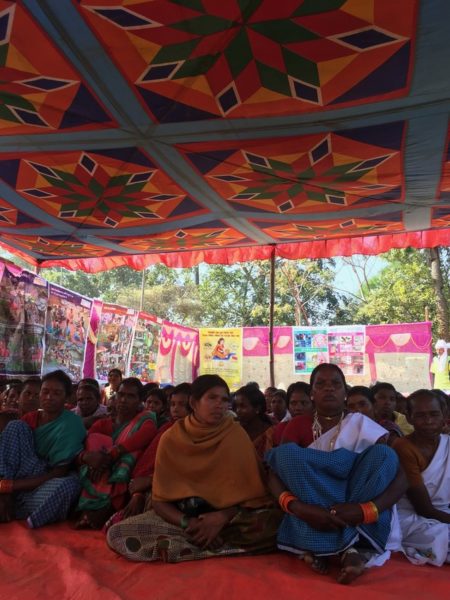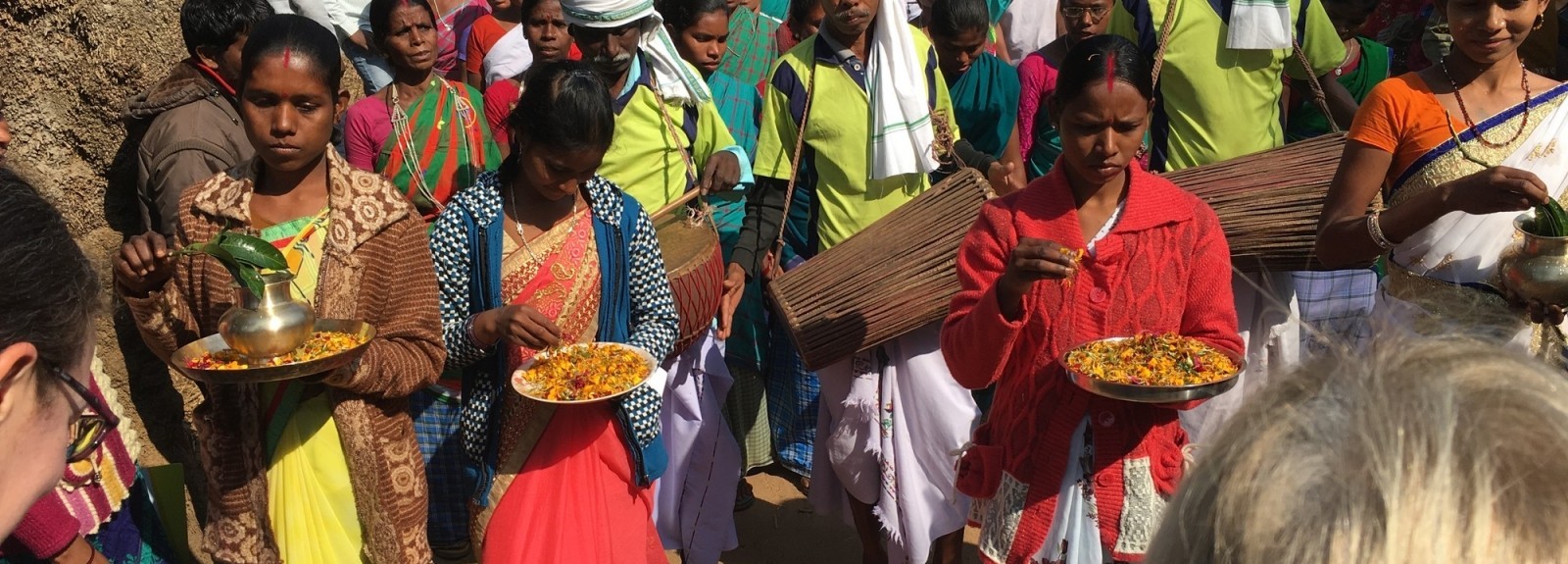Ms. Bennett is a member of Trinity Lutheran Church in Whidbey Island, Wash, one of the congregations that is directly supporting communities in India through Partnership Bihar. In this post, Ms. Bennett visited Bihar in January 2018 and reflects on her experience.
My hands were clasped firmly by two of our hostesses and I was drawn into a procession into the village. Before me, ranks of tribal women farmers dressed in colorful saris sang and danced in unison following a troop of village drummers.
On my neck: a necklace of marigolds; at my feet: marigold petals; on my head and face: fresh sprinklings of water from a bright green branch dipped in a brass pot. On either side, more hostesses ushered my female colleagues into the dance and on to the village. Behind us, more women were dancing and singing, all rocking along in a sea of sound and camaraderie. It was heady and humbling and joyful. I have rarely felt such a kindred spirit without words or names — none were needed in this organic celebration of the women of the village greeting the women who had come to visit.
So began our visit to Kusumdih a tribal village in Bihar, India. I had come because my church, Trinity Lutheran of Whidbey Island, Wash., is financially supporting a program through Lutheran World Relief to help women farmers build sustainable farming practices.
Women farmers raise a variety of vegetables during the 9-month drought season when their husbands tend be away earning money in the cities. Entire families work together during the 3-month monsoon season to raise rice, a more labor-intensive crop. These villagers are completely dependent on what they grow.
Ours is a service project, not evangelizing or church planting, simply a gift to those in need.
I came to learn about the project and begin building relationships with those who are helping and those who are participating. I was prepared to learn about drought-resistant crops and erratic monsoon patterns caused by climate change; the health of chickens and goats and recipes for organic fertilizer and pesticide using cow dung; women’s rights, nutritional needs, and deep poverty ... but I was not prepared to have my heart filled with the sheer joy of this welcome.
I was not prepared to receive such a blessing. It was a heart-to-heart, spirit-to-spirit gift from the village women to me and our group. Beyond financial support, beyond curiosity, MY heart was tenderized by this encounter, and MY sense of place in the human family and God’s kingdom became broader and more inclusive that day.
Freely you have received, freely give. (Matthew 10:8)
Such is the economy of God that in the process of giving we express our own thankfulness for God’s abundant love and generous blessings and we express our pleasure in being in a position to give to others. In this gesture, we open ourselves to possibilities outside our frame of reference – God’s possibilities. God invaded my spirit the day I entered Kusumdih village. I was reminded of the delight I had felt a year before this visit to be able to give to this project, and I was overwhelmingly grateful, first to God for His great kindness to me in making this visit possible, and then to these lovely unknown women who were so blessing me with their welcome.
After our procession into Kusumdih village, we assembled under a colorful canopy to learn about the village, the women and the program. In their animated responses to our translators, there was no mistaking their confidence, good humor, support of each other, respect for their designated spokespersons and understanding of the details of the program.

They were not shy in clarifying points with the translators, and often talked and laughed among themselves before responding to us. It was hard to imagine that prior to the launch of self-help groups, many of these women were isolated in their homes and lacked the vibrant social connections evident in our conversation. We asked lots of questions and they responded thoroughly. I especially enjoyed their description of ways the women of this village had decided to assist a family in a neighboring village whose home had been damaged by fire. They were proud to have made the decision to help and proud to have had resources to be of assistance.
After the formal discussion, we adjourned to informal socializing as we visited demonstrations of programmatic components. Women spoke at each station. They explained how to take body mass index readings and prepare homemade organic chicken feed, fertilizer and insecticide. They described various veterinary strategies to improve livestock health and demonstrated a portable sprayer for their crops. They were competent and serious in their presentations, but quick to laugh as the formal presentations were interrupted by children, a stray calf or baby goat, husbands wanting to participate, or an especially tall visitor from our group who offered to participate in some of the demonstrations.

It was during this phase of the day that I met three women with whom I spent enough time to feel that we were getting to know each other – at least a little. I was not successful in remembering names, but our conversations embellished my understanding of their lives.
One woman is a new staff member for the program. She had just finished living in a village for a month to determine if this job is a good match for her. She loved it and was non-stop that day hugging children, catching up on news, making introductions. We had a short talk about her work to revitalize life in India’s villages, where the majority of India’s population resides. She was interested in our community life on Whidbey Island but she was soon off to other conversations.
A second woman shattered my perception of remote village life. She is a student earning her master’s degree in public administration through web-based classes from the village. Her goal is to use her talents to assist her village. She quietly and confidently described her commitment to helping her community however she can.
The third woman, one of the oldest at the gathering, was clutching a small booklet which she was eager to share. It is a ledger with carefully written entries reflecting her steady, modest savings. She was so proud to have money of her own!
Because of her age, drawing on what I had been learning about the culture of the area, I assumed she was among the women who had been married at a young age (possibly as young as 12), may never have attended school and would have moved to the village as a new bride where she would serve her husband and his parents and tend her husband’s land. I had heard that a woman might never be called by her first name again after her wedding, and that women and girls would serve the men and boys first, then make their meal of what was left. These cultural practices have generated a legacy of female illiteracy and malnutrition, and a pattern of low birthweight babies. The program we are supporting addresses equity which is a delicate, but important subject. I learned that some families have recently begun to eat their meals together, and some have begun to send their daughters to school.
Knowing this cultural history, I assumed that marriages might also lack emotional closeness. My new friend corrected my impression when I asked about her husband. She fought back tears as she explained that he had recently passed away.
As the afternoon progressed, we took pictures and enjoyed the children, and soon it was time to leave. It is unlikely we will cross paths again because the program is designed to move to new villages once new skills stabilize in each village. I am glad to have pictures that remind me of these brief and very sweet encounters.
I left Kusumdih realizing that my new friends and I had received the promise of Proverbs 22:9: together we had explored a reciprocal exchange in which all were blessed. This busy day was filled with multiplied blessings.
Those who are generous are blessed, for they share their bread with the poor. (Proverbs 22: 9)
Give and it will be given to you. A good measure, pressed down, shaken together and running over, will be poured into your lap. For the measure you use, it will be measured to you. (Luke 6:38)
Reflecting on our visit, I learned all I hoped and received far more than I imagined. The program sponsored through Lutheran World Relief for tribal Indian women farmers, who are among the poorest of the poor in the world, is generating improved quality of life for thousands and teaching skills which promise to be sustainable.
With the help of this program farmers are contending successfully with climate changes that are altering patterns of rainfall and drought, women and children are healthier, livestock are thriving, and crops are sufficient for yearly needs and diverse enough to meet basic nutritional requirements. Individuals, families and village self-help groups are accumulating savings that enable them to meet their own needs and assist each other. Finally, through formation of village self-help groups, these women are acquiring a voice recognized on the regional level by the government of India.
I feel proud and fortunate to participate in this transformative service project of mercy to some of the world’s poorest and I encourage Lutheran World Relief and Trinity Lutheran to continue to support this growing service ministry.
This service that you perform is not only supplying the needs of God’s people but is also overflowing in many expressions of thanks to God. (2 Corinthians 9:12)


